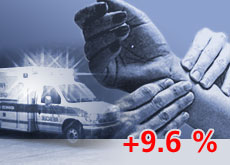Health premiums rise again

For the second year running, the Swiss are facing a huge increase in their health insurance bills.
On Friday the government announced an average hike of 9.6 per cent for the cost of basic compulsory cover for 2003.
Interior Minister Ruth Dreifuss found it hard to hide her disappointment at not being able to keep the increase below last year’s 9.7 per cent.
She said a combination of increased demands on health services and a failure to keep costs in check had forced up premiums.
Across the country adults will now pay an average of SFr268 ($180) per month, but there are huge differences from canton to canton.
Geneva will continue to have the highest monthly premiums at an average of SFr389. While people living in Appenzell Inner Rhodes will pay a nationwide low of SFr173.
Rising costs
Dreifuss pointed out that the costs covered by basic health insurance had risen by almost 30 per cent since 1996 and this had put a tremendous strain on the reserves of health insurers.
Nicole Bulliard of Santésuisse, the health insurers’ association, said the hike in premiums had not come as a surprise.
She said costs to the industry were expected to rise by about five per cent this year, leaving insurers facing a SFr700 million shortfall.
“The situation has become catastrophic over the past two years,” she told swissinfo.
“Reserves cannot be used to keep premiums artificially low and the law needs to be revised to bring down the costs of health care.”
Bulliard said that simple measures such as discouraging doctors from overprescribing drugs and educating patients could be introduced to help ease the burden.
A shocking suggestion
Another Santésuisse proposal to avoid future hikes in premium rates is to increase the amount paid by the over-50s, who put more strain on the system.
Bulliard claims they represent the wealthiest sector of the population and are in a better position to be able to pay more.
“It is very difficult for young people and especially those with families to continue to support the health costs of the older generation,” she said.
That argument did not go down well with Dreifuss who said she was “shocked” by the suggestion.
Dominique Sprumont, a professor of health law at Neuchâtel University, told swissinfo it contradicted the principles upon which the Swiss system was based.
“There is supposed to be solidarity between the rich and the poor, the young and the oldest, the healthy and the sick,” he said.
“Now the social insurers are saying the wealthier should pay more – that is unacceptable unless you want a completely new law of course.”
A quality system
Healthcare costs in Switzerland are among the most expensive in the world. According to 1998 figures from the Organisation of Economic Cooperation and Development, health costs in Switzerland account for 10.4 per cent of the country’s Gross Domestic Product (GDP).
That puts Switzerland in second place behind the United States with 12.9 per cent of GDP. But Sprumont maintains the system also has a deserved reputation for high quality.
He says everyone has access to a broad scope of care and there is a high density of university hospitals and research, both of which contribute to the costs of the system.
He also insists that those costs appear to be exaggerated by the way in which they are financed.
“We feel that costs are rising more quickly because the money, or the premiums, are taken directly from our pockets,” he says.
“In other countries the healthcare system is financed directly through taxes.”
But Sprumont warns that the system will come under increasing pressure if there are continued hikes in premiums.
“More people will be forced to seek assistance from the cantons in making their payments,” he says. “That is why the financing of our system needs to be thoroughly reconsidered.”
Making sacrifices
The control of healthcare costs around the world is a problem, and Switzerland is no exception to a trend that was identified as far back as the 1970s.
Santésuisse hopes that proposals for the revision of the funding of hospitals and changes in the contract-based system of medical care will make their way through parliament quickly to ease the financial burden on the system.
But Sprumont questions whether the Swiss would be prepared to sacrifice the quality of their system for a drop in costs.
“If we want to pay less,” he says. “We need to accept less stringent quality or settle perhaps for standards that are not quite so high.”
swissinfo, Jonathan Summerton
The cost of basic coverage will rise by and average of 9.6 per cent.
Adults will pay an average of SFr268 per month.
Geneva will have the highest monthly premiums – an average of SFr389.
Basic health insurance has risen by almost 30 per cent in Switzerland since 1996.

In compliance with the JTI standards
More: SWI swissinfo.ch certified by the Journalism Trust Initiative










You can find an overview of ongoing debates with our journalists here . Please join us!
If you want to start a conversation about a topic raised in this article or want to report factual errors, email us at english@swissinfo.ch.